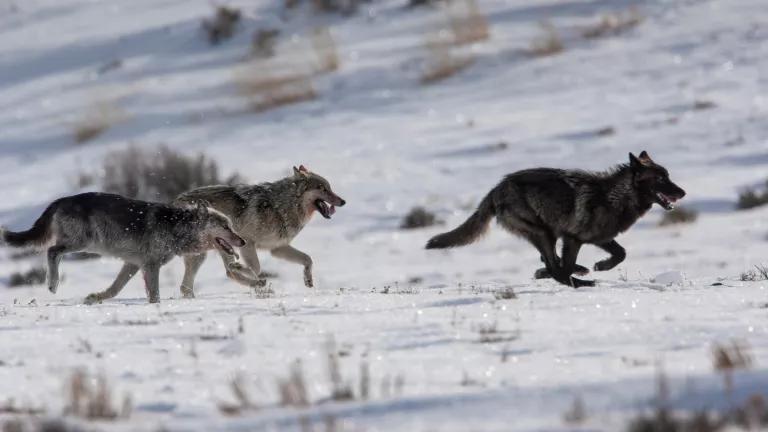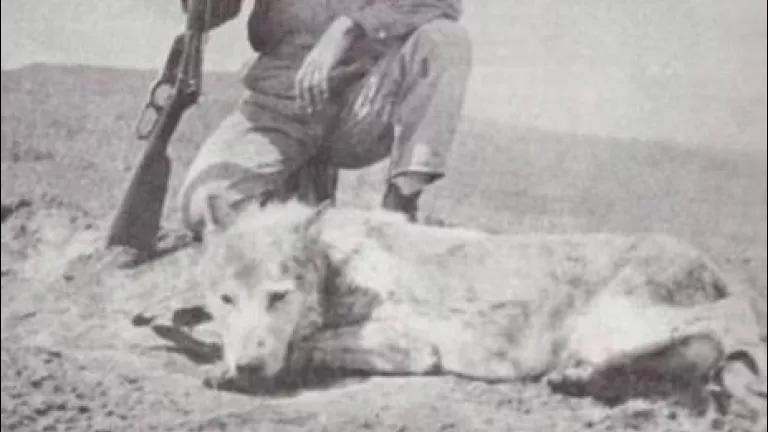Northern Rockies Wolves Need Federal Action
A chorus of diverse voices has united with a clear message: The federal government needs to restore protections before decades of investments and hard-earned conservation progress are lost.

Photo: Thomas Bonometti on Unsplash
The gray wolves that roam and howl across the Northern Rockies landscape today have endured a tumultuous history. A federal extermination program wiped their ancestors off the map by the early 1900s. Then, federal protection and restoration helped them slowly reclaim habitat across the region until 2011—when their Endangered Species Act (ESA) protections were stripped through a political maneuver that had nothing to do with science and lacked adequate safeguards to ensure long-term recovery. States have offered increasingly aggressive and poorly-regulated wolf hunting and trapping ever since. This year, state mismanagement of wolves hit a new low in the Northern Rockies, prompting a chorus of diverse voices to unite with a clear message: the federal government needs to restore protections to Northern Rockies wolves before decades of investments and hard-earned conservation progress are lost.
In 2021, state legislators and governors in Montana and Idaho threw evidence, reason and ethics to the wind in pursuit of wolf eradication policies that harken back to the late 1800s. These politicians have undermined and tied the hands of their own state’s wildlife professionals. Idaho’s new policies went into effect on July 1st, which allow individuals to kill an unlimited number of wolves, kill pregnant wolves and litters of pups, and run down wolves with ATVs and snow machines. Montana’s state wildlife agency has been directed by legislators and the governor to allow similarly extreme and outdated tools, including a wolf bounty. Following the approach Wyoming has taken for years, these efforts share one goal—to cut wolves down to a bare minimum population required by the abysmal state wolf management plans. This is not wildlife management, and it is not hunting according to the basic ethics of practice. This is unjustified and unfettered killing of a native mammal and keystone species.

A historic image of men surrounding a dead wolf from the early 1900s.
In a recent Washington Post op-ed, former U.S. Fish and Wildlife Service Director Dan Ashe came out with a strong statement against the new wolf policies in the Northern Rockies, rightly referring to recent state actions as “an epidemic of cruelty” and “ecocide.” This is significant because Ashe championed the removal of federal protections for Northern Rockies wolves over a decade ago, asserting that Montana, Idaho and Wyoming were ready to take over the reins of wolf management. Now, he joins the ranks of other former officials, wildlife professionals, scientists across the globe, renowned wildlife photographers, conservationists and even hunters who are calling for science and ethics to be restored to wolf management.
The Global Indigenous Council and tribal leaders have also raised their powerful voices to highlight the deep cultural connections Indigenous nations share with wolves in an appeal to Interior Secretary Haaland to restore protections to wolves. While the Trump administration ignored federally mandated tribal consultation and declined to accept receipt of The Wolf Treaty—signed by over 120 tribes and Indigenous leaders—Secretary Haaland has an opportunity and a responsibility to meet with tribes and hear their perspectives.
FAMILY— A new short film from the Global Indigenous Council asking Secretary Haaland to relist wolves under the ESA. Directed by Rain; Narrated by Crystle Lightning.
The path forward is clear and resounding. Secretary Haaland and other leaders need to chart a new course for wolf recovery. The Northern Rockies states have drastically altered their wolf management approaches and stripped away most limitations on wolf killing. This poses a threat to the region’s wolves and warrants emergency listing under the ESA. NRDC joined more than 50 organizations in support of a formal emergency petition to relist gray wolves in the Northern Rocky Mountains.
On top of an emergency relisting of the Northern Rockies wolf population, there are additional steps the administration should take to ensure gray wolf restoration will remain one of our country’s most celebrated conservation success stories. We call on leaders in the administration to take the following steps:
- Reverse the 2020 national delisting rule and return protections to all wolves until they are fully recovered and states adopt management plans that reflect a genuine commitment to steward them as a valued native species.
- Create a council of independent scientists and wildlife managers to ensure science and objective evidence guide wolf management. This council should review and make recommendations on the future management of wolves.
- Develop a comprehensive national recovery plan ensuring that wolves adequately meet requirements of the ESA before delisting.

The wolves will never know about the political, legal, and cultural debates taking place in their name. They will go on simply being wolves until they are shot, strangled by snares, run down by vehicles and aircrafts, or slaughtered alongside their pups. People across the country are raising their voices in opposition because wolves can’t. These howls will continue until Secretary Haaland and the Biden Administration answer back.



